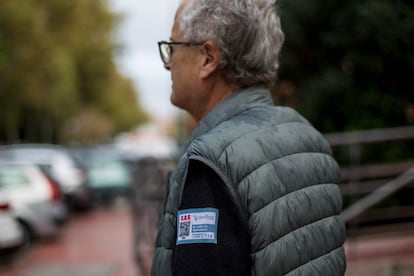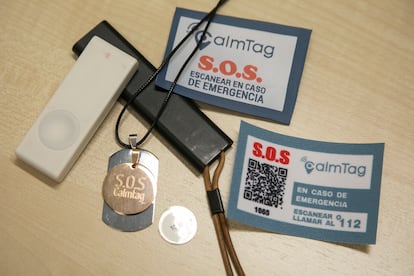Apps, smart watches and QR tags help keep track of people with dementia
Devices enable patients to live more independently but also raise privacy concerns

The first time it happened, security guards found him outside the Atocha metro station in Madrid. When his wife arrived to pick him up after searching for two hours, he didn’t recognize her. Another time, he got lost in a hospital, and he recently went missing on his way to the bank. Now, he’s afraid to go out. “He doesn’t want to go out anymore unless I’m with him,” says his wife, Asunción (not her real name) during an Alzheimer’s family support group session. Every Thursday, a dozen patients and their relatives meet to share their experiences, questions and problems. They often say that they worry about a relative wandering off and getting lost, unable to return home.
According to the Alzheimer’s Association, six in 10 people living with dementia will wander at least once and many do so repeatedly, increasing the risks of getting lost and having accidents. In an effort to address the wandering problem and facilitate searches, Spain’s National Police and Civil Guard developed and launched Alertcops, an app with a “Guardian” function that enables location sharing with trusted people. This helps track and locate people during emergencies and wandering episodes. As of October 2022, more than 70,000 citizens have activated the “Guardian” function according to Spain’s Ministry of the Interior, and 80% of them are using the location-sharing feature to track their loved ones.
Of course, this means that an Alzheimer’s patient must carry a mobile phone at all times. Luis Miguel Ballestero Blanco, president of the Madrid regional Alzheimer’s Federation (FAFAL), says that apps like Alertcops are very useful in the early stages of the disease. But during the more advanced stages, many people forget how to use the phones and are more likely to leave them at home. “When they can no longer take care of themselves, they need a solution that’s attached to their clothing,” says Ballestero.
In the Madrid suburb of Alcobendas, the city council, local police and Alzheimer’s association have been working for over a year to adapt the available technology to different aspects of the disease. So far, they have developed two free devices: a geolocator watch that sends real-time location data, and stickers with QR codes that provide basic information about the person wearing the sticker (name, disease, allergies, and an emergency phone number). Anyone who finds a wandering person wearing the sticker can read the QR code with a mobile phone camera and call the emergency number provided. The objective of devices such as these is to protect people with cognitive impairment while enabling them to retain a measure of independence.
The Alzheimer’s family support group (AFA) in Alcobendas also recommends devices such as key rings, medallions and necklaces with GPS locators. Alcobendas AFA coordinator Carmen Barroso recommends using tags that can’t be easily removed for people with advanced cognitive impairment.

Barroso says it’s important to use these devices even when family members feel they may not be needed during the early stages of the disease. The first time a person wanders is always unexpected, she says, and it usually happens in an everyday situation. “For example, you’re in a shopping mall and turn around to pay the cashier. Something catches their attention, and in an instant, they just wander away,” she says. It’s much more serious when a person gets lost on the city streets and can’t find their way home.
Concha Gómez-Tejedor also works at AFA Alcobendas and has personally experienced the anxiety of losing a loved one. “At some point, everyone with Alzheimer’s wanders off,” she says. During a vacation a few years ago, her husband got lost for two and a half hours. “We were in an unfamiliar place that we were visiting for the first time. He wandered around for two hours, and I didn’t know what to do or where to look. It was horrible. Back then, we didn’t have devices like these.” That’s when Gómez-Tejedor and her stepdaughter began looking for devices that could help, such as GPS-enabled key chains and bracelets, and tags with the near-field communication (NFC) technology that mobile phone payment apps use. “Some of them are too big or have poor coverage, and others have a very short battery life. You have to find one that suits the stage of the disease and your individual situation,” says Gómez-Tejedor as she displays some of the devices they tested.
The locator devices allow patients with cognitive diseases to become less reliant on others for everyday tasks. In some cases, it may be the last chance at independent living before they need to be moved into an assisted living facility. However, some people question whether these devices violate a person’s privacy. Would a completely healthy person agree to be tracked, even with the best of intentions? Most would probably say no, and the elderly or infirm may feel inhibited if they know they are being tracked.
A study on the ethics of GPS tracking of people with dementia conducted by Febe de Vos of Utrecht University in the Netherlands concluded that the person being tracked should provide their consent whenever possible. It’s a complex issue, says De Vos, and every situation is different, especially in the first stage of Alzheimer’s disease. “Since we don’t have the patient’s complete perspective, we don’t know the extent to which they are able to make decisions. It is very difficult to verify,” he says. Family members say people with Alzheimer’s frequently refuse to use the devices because they don’t understand or want them. Many Alzheimer’s associations favor their use, with or without consent. “The initial problem is serious because people can suddenly get lost without any warning,” says Ballestero Blanco.

Sven Nyholm supervised the ethics study conducted by De Vos and agrees on the importance of obtaining consent. He believes that families should discuss using locator devices with the patient beforehand. While privacy is very important, says Nyholm, it’s not the only consideration and may not even be the most important one in certain stages of life. Privacy has to be assessed alongside health and safety. “Random GPS tracking of strangers is a very different type of privacy violation than tracking an elderly relative,” said Nyholm, an expert on ethics in technology.
Nyholm also says that an important but overlooked issue is the third parties involved – the companies that develop and sell the technology. “It’s not just about the privacy aspects of monitoring our parents. It’s also about who else might be watching. Who else might benefit from the information or data that’s collected? This is something else to consider,” he notes. Since regulators are generally a few steps behind the latest technological developments, he advises families to be cautious when selecting a tracking device.
Sign up for our weekly newsletter to get more English-language news coverage from EL PAÍS USA Edition
Tu suscripción se está usando en otro dispositivo
¿Quieres añadir otro usuario a tu suscripción?
Si continúas leyendo en este dispositivo, no se podrá leer en el otro.
FlechaTu suscripción se está usando en otro dispositivo y solo puedes acceder a EL PAÍS desde un dispositivo a la vez.
Si quieres compartir tu cuenta, cambia tu suscripción a la modalidad Premium, así podrás añadir otro usuario. Cada uno accederá con su propia cuenta de email, lo que os permitirá personalizar vuestra experiencia en EL PAÍS.
¿Tienes una suscripción de empresa? Accede aquí para contratar más cuentas.
En el caso de no saber quién está usando tu cuenta, te recomendamos cambiar tu contraseña aquí.
Si decides continuar compartiendo tu cuenta, este mensaje se mostrará en tu dispositivo y en el de la otra persona que está usando tu cuenta de forma indefinida, afectando a tu experiencia de lectura. Puedes consultar aquí los términos y condiciones de la suscripción digital.









































